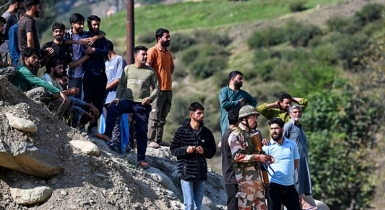
Who will be benefitted, if a running garment factory is suddenly closed as a result of unrest? The question is important because the unrest in the garment sector is taking place during BNP-Jamaat's program of vandalism and arson centered around the 12th Jatiyo Sangsad elections. However, according to BGMEA President, less than 5 percent of garment factories are closed in the ongoing agitation. Moreover, “only those factories have been closed which were vandalized by outside instigation or were not working.” It could be seen from the pictures and videos that most of demonstrators are not ordinary workers. Outsiders are vandalizing, breaking gates and setting fire. Destroy fire extinguishers, cut pipes. So as a common worker, if a fire broke out in the factory, he thought how to put it out. From this it can be understood that it is not a labor movement, it is being provoked from outside. The BGMEA president could not recognize the identity of the demonstrators.
However, it could be safely said that some conspirators are mainly inciting chaos in the garment sector. They are the ones who have successfully fueled labor unrest. This information has come out in the investigation of several intelligence agencies of the government. An intelligence agency has informed the top administration of the government. There the names of labor leaders and NGOs have been identified and given in written form. BGMEA President Farooq Hasan said, ‘I think if it was a real labor movement, 95 percent of the factories would not be running. Some opportunistic people are doing these acts of vandalism by making an issue of salary. Fire is coming from outside. The workers died in the fire started by the outsiders. So I think, of course, it's fueling from outside.’
Many people are getting employment from garment business which is the major economic sector of the country. But domestic and foreign conspiracies continue to destroy Bangladesh's garment industry. Misinformation has been going on about this for a long time. A vested interest group is conspiring at home and abroad to hand over this industry to different countries. Attempts are being made to tarnish the image of the country by creating dissatisfaction in garments in various ways including inciting workers, pressuring trade unions. Some countries have nurtured labor leaders and a class of NGOs behind the scenes.
The same way they destroyed the jute mills, they are planning to destroy the garment industry. Garment products of Bangladesh are available at low prices compared to other countries. The government also provides many facilities to the owners. The government gave nominal interest incentives during Corona. There have also been complaints that some countries are patronizing some leaders of the garment workers! They use these labor leaders as tools to destabilize the government in any way. Violent incidents including arson and vandalism are committed in the garment industry. Currently, more than three hundred garments are closed due to these incidents. Some owners also take advantage of these events.
The political circles that want to seize political power by creating unrest and anarchy through arson and vandalism can get benefit from the ongoing unrest in the RMG sector!
According to observers, hundreds of organizations have been formed in the garment sector in the name of protecting the interests of workers in the last decade. About half a dozen of these are federations. Most organizations are not even registered. Most of the leaders of these organizations are not even directly associated with the garment factories. These people work for different political parties, local and foreign conspirators. They are the ones who basically try to profit themselves by putting the workers on the streets.
The investigation of the intelligence officers also revealed that the identified leaders of various labor organizations are planning to create anarchy in the garment sector. Some of these leaders live in luxury. Meanwhile, the owners of the garment industry have decided to close the factory if the workers protest without working or vandalize the factory. According to section 13 (1) of the Labor Act, they are talking about the implementation of the rule of 'no work, no wages'. The owners have also closed several garments in this rule.
The garment industry is key to the economy of Bangladesh as a whole. Instability in this very important sector of Bangladesh's economy is causing great damage to the country's economy. In the fiscal year 2021-2022, Bangladesh exported garments worth US$ 42.613 billion, making it the world's second largest garment exporter, according to data from the Export Development Bureau. In addition, the garment industry is a significant source of employment and income for Bangladesh, with more than 4 million people (almost twice the population of New Mexico) employed in the sector.
In the financial year 2022-2023, 84.58 percent of Bangladesh's total export earnings came from the ready-made garment sector. According to the data provided by BJMEA, the total export earning in the financial year 2022-23 was US$ 55558.77 million. Of this total export earnings, 46991.61 million US dollars came from the ready-made garments sector.
The United States is the largest export destination for Bangladeshi garments, accounting for about 21.50% of total exports. The European Union (such as Spain, Germany, Italy, France, Belgium and the Netherlands) is the second largest export destination for Bangladeshi garments, followed by
Bangladesh's garment exports to neighboring India increased by 69.58% to $715.41 million in 2021-2022. According to the information provided by BGMEA, Bangladesh's garment manufacturers aim to reach $100 billion in export earnings by 2030. Against this backdrop, attempts to create instability in Bangladeshi garments are undoubtedly disappointing.
The reason for the unrest appears to be workers' demands for increased wages. But the government has already increased the wages of garment workers. After five years, the government has increased the minimum wage of garment workers by 4,500 taka. As a result, workers working in garment factories will receive a minimum salary of Tk 12,500 from next December. Which will be available from January 2024.
Earlier in 2018, the minimum wage was increased by 2700 taka to 8 thousand taka. Before that in 2013 which was five thousand 300 taka. In other words, the minimum salary of garment workers has been increased by 7 thousand 200 taka in the last 10 years. In 2008, the wages of garment workers was 3 thousand rupees. Their salary has increased by 9 thousand 500 taka in the last 15 years. In this context, the Minister of State for Labor has called upon the protesting workers to rejoin their respective factories.
However, it is essential to note that while some entities with ill-motive may get benefit from ongoing unrest, these conditions often have negative impacts on workers, particularly in Bangladesh where the garment industry is a significant employer. Accordingly, the workers should immediately join to maintain the stable and peaceful situation in their factories as well as in the country that will help to solve their problems.
Professor Dr. Arun Kumar Goswami, Director, Center for South Asian Studies, Former Dean, Faculty of Social Sciences, Former Chairman, Department of Political Science, Jagannath University.





































